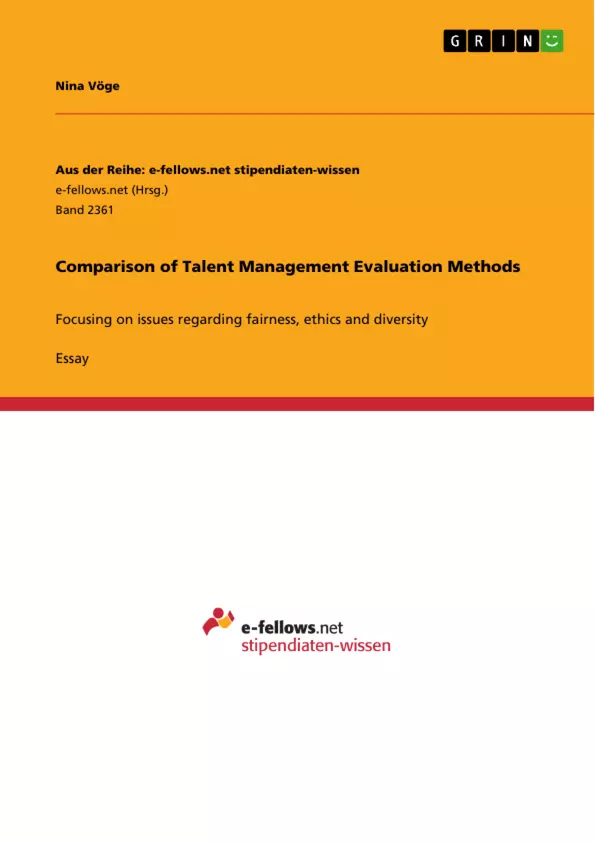An essay about the different evaluation methods of talent management practices. Focusing on issues regarding fairness, ethics and diversity.
According to a recent study from Bersin by Deloitte, conducted amongst 220 UK organisations, the spending on Learning and Development (L&D) increased from 2014 to 2015 to an average of £1,068 per learner per year. It was also reported that the number of training hours per employee rose from 14.5 in 2012 to 16.2 in 2015. This increased focus on L&D can be seen as an answer to today’s global economy that has created a more complex, dynamic and volatile environment in which companies must learn to compete effectively to achieve sustainable growth. In addition, most organisations are facing internally several challenges including the effective management of talent flow, a shortage of needed competencies and an increasingly diverse and mobile workforce which requires them to put a greater focus on L&D.
Against this background, it becomes apparent that the high investments in L&D and thereby the possibility for consistent skill up gradation are of great importance, as what might be an effective training program in the past may not be so in the future. However, with this also the question of the measurability of L&D practices and in turn of their identifiable impact on the organisations’ overall effectiveness arises.
In this light, this essay strives to explain the importance of the evaluation of talent management practices by contrasting and comparing different ways of monitoring and evaluating the impact and success of these whilst considering possible issues related to fairness, ethics and diversity.
Inhaltsverzeichnis (Table of Contents)
- The wider context of Talent & Talent Management
- Strategic Human Resource Development
- L&D Interventions
- Learning Organisations
- Talent & Talent Management
- Questions of ethics, fairness & diversity
- Equity
- Fairness and Organisational Justice
- Diversity
Zielsetzung und Themenschwerpunkte (Objectives and Key Themes)
This essay aims to explain the importance of evaluating talent management practices by contrasting and comparing different ways of monitoring and evaluating their impact and success. The focus is on identifying potential issues related to fairness, ethics, and diversity within the context of Talent Management. While providing a comprehensive analysis, the essay is naturally limited in scope due to word constraints.
- The importance of evaluating Talent Management practices
- Different approaches to monitoring and evaluating Talent Management impact
- Issues related to fairness, ethics, and diversity in Talent Management
- The role of equity and fairness in ensuring positive outcomes of Talent Management
- The impact of legislative regulations on ethical code and workforce diversity
Zusammenfassung der Kapitel (Chapter Summaries)
The first chapter explores the wider context of Talent & Talent Management, delving into Strategic Human Resource Development, L&D interventions, Learning Organizations, and the evolution of talent management concepts. This section highlights the importance of L&D interventions in bridging the gap between HR strategy and overall business strategy, emphasizing the significance of a learning organization. The chapter then delves into the concept of 'talent' and 'Talent Management', tracing its origins and exploring different perspectives on talent.
The second chapter focuses on the ethical considerations surrounding Talent Management, examining concepts of equity, fairness, and diversity. It explores the motivational impact of including individuals in Talent Management programs, but also the need for careful communication to avoid undermining equity. The chapter emphasizes the importance of establishing ethical goals, strategies, and leadership within organizations. It also highlights the role of L&D professionals in communicating ethical codes of conduct and ensuring ethical practices.
Schlüsselwörter (Keywords)
The essay centers around Talent Management, its evaluation, and its ethical implications. Key terms and concepts include Learning and Development (L&D), Strategic Human Resource Development, L&D interventions, Learning Organisations, Talent Management (TM), equity, fairness, diversity, organizational justice, psychological contract, and ethical code of conduct.
Frequently Asked Questions
Why is evaluating Talent Management practices important?
Evaluation is crucial to measure the identifiable impact of high investments in Learning and Development (L&D) on an organization's overall effectiveness and sustainable growth.
What are common issues regarding fairness in Talent Management?
Issues include ensuring equity when selecting individuals for high-potential programs and maintaining a psychological contract that doesn't alienate those not included.
How does diversity impact Talent Management?
An increasingly diverse and mobile workforce requires L&D strategies that respect different backgrounds while adhering to legislative regulations and ethical codes of conduct.
What is the role of a Learning Organisation in TM?
A Learning Organisation fosters continuous skill upgrading, bridging the gap between HR strategy and business objectives in a volatile global economy.
How can ethical practices be ensured in Talent Management?
Organizations should establish clear ethical goals, leadership accountability, and communicate a strong ethical code of conduct through L&D professionals.
- Citation du texte
- Nina Vöge (Auteur), 2017, Comparison of Talent Management Evaluation Methods, Munich, GRIN Verlag, https://www.grin.com/document/368481



